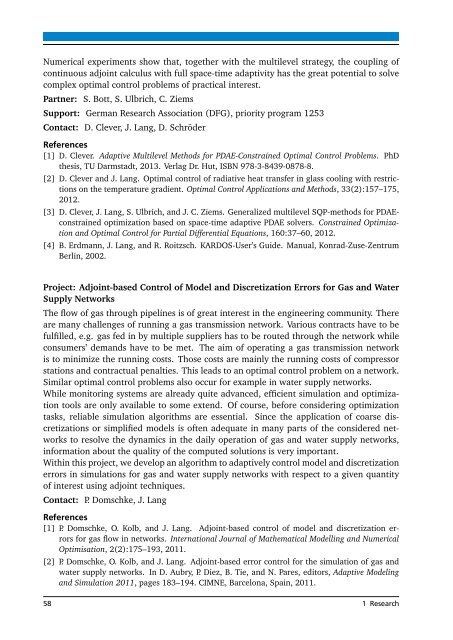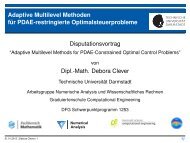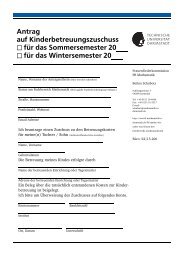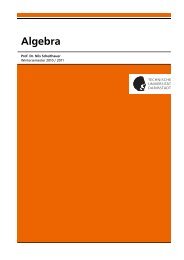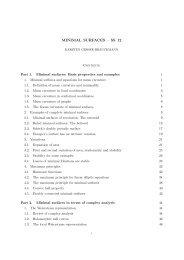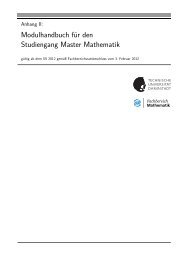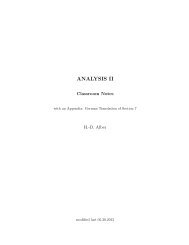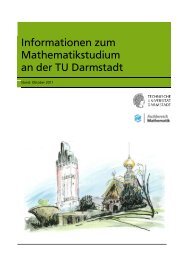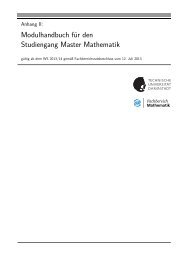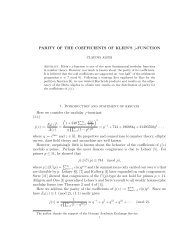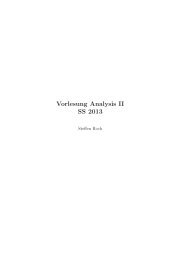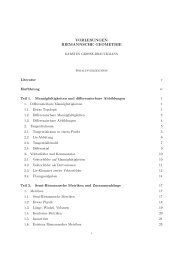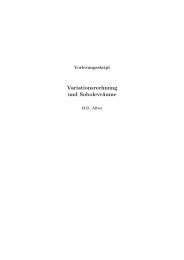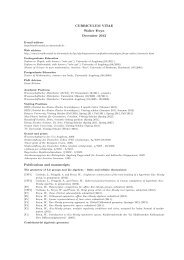Biannual Report - Fachbereich Mathematik - Technische Universität ...
Biannual Report - Fachbereich Mathematik - Technische Universität ...
Biannual Report - Fachbereich Mathematik - Technische Universität ...
You also want an ePaper? Increase the reach of your titles
YUMPU automatically turns print PDFs into web optimized ePapers that Google loves.
Numerical experiments show that, together with the multilevel strategy, the coupling of<br />
continuous adjoint calculus with full space-time adaptivity has the great potential to solve<br />
complex optimal control problems of practical interest.<br />
Partner: S. Bott, S. Ulbrich, C. Ziems<br />
Support: German Research Association (DFG), priority program 1253<br />
Contact: D. Clever, J. Lang, D. Schröder<br />
References<br />
[1] D. Clever. Adaptive Multilevel Methods for PDAE-Constrained Optimal Control Problems. PhD<br />
thesis, TU Darmstadt, 2013. Verlag Dr. Hut, ISBN 978-3-8439-0878-8.<br />
[2] D. Clever and J. Lang. Optimal control of radiative heat transfer in glass cooling with restrictions<br />
on the temperature gradient. Optimal Control Applications and Methods, 33(2):157–175,<br />
2012.<br />
[3] D. Clever, J. Lang, S. Ulbrich, and J. C. Ziems. Generalized multilevel SQP-methods for PDAEconstrained<br />
optimization based on space-time adaptive PDAE solvers. Constrained Optimization<br />
and Optimal Control for Partial Differential Equations, 160:37–60, 2012.<br />
[4] B. Erdmann, J. Lang, and R. Roitzsch. KARDOS-User’s Guide. Manual, Konrad-Zuse-Zentrum<br />
Berlin, 2002.<br />
Project: Adjoint-based Control of Model and Discretization Errors for Gas and Water<br />
Supply Networks<br />
The flow of gas through pipelines is of great interest in the engineering community. There<br />
are many challenges of running a gas transmission network. Various contracts have to be<br />
fulfilled, e.g. gas fed in by multiple suppliers has to be routed through the network while<br />
consumers’ demands have to be met. The aim of operating a gas transmission network<br />
is to minimize the running costs. Those costs are mainly the running costs of compressor<br />
stations and contractual penalties. This leads to an optimal control problem on a network.<br />
Similar optimal control problems also occur for example in water supply networks.<br />
While monitoring systems are already quite advanced, efficient simulation and optimization<br />
tools are only available to some extend. Of course, before considering optimization<br />
tasks, reliable simulation algorithms are essential. Since the application of coarse discretizations<br />
or simplified models is often adequate in many parts of the considered networks<br />
to resolve the dynamics in the daily operation of gas and water supply networks,<br />
information about the quality of the computed solutions is very important.<br />
Within this project, we develop an algorithm to adaptively control model and discretization<br />
errors in simulations for gas and water supply networks with respect to a given quantity<br />
of interest using adjoint techniques.<br />
Contact: P. Domschke, J. Lang<br />
References<br />
[1] P. Domschke, O. Kolb, and J. Lang. Adjoint-based control of model and discretization errors<br />
for gas flow in networks. International Journal of Mathematical Modelling and Numerical<br />
Optimisation, 2(2):175–193, 2011.<br />
[2] P. Domschke, O. Kolb, and J. Lang. Adjoint-based error control for the simulation of gas and<br />
water supply networks. In D. Aubry, P. Diez, B. Tie, and N. Pares, editors, Adaptive Modeling<br />
and Simulation 2011, pages 183–194. CIMNE, Barcelona, Spain, 2011.<br />
58 1 Research


